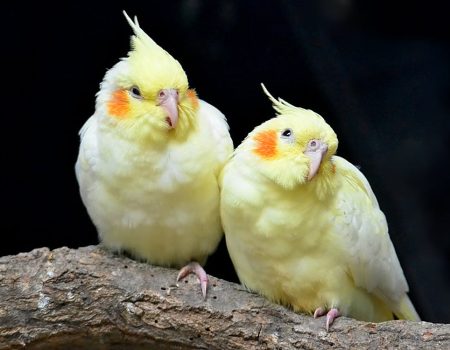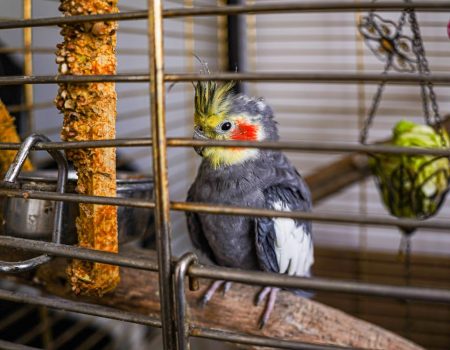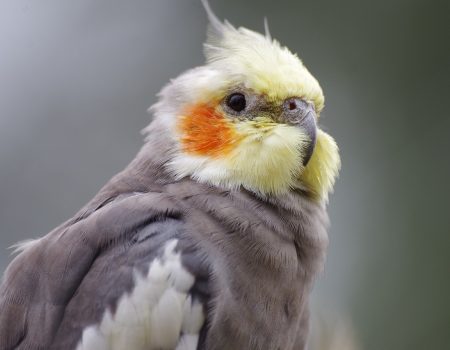Did you know that with the right diet, your cockatiel can live up to 20 years or more? That’s a long time for a pet, and it means your bird can be a loving companion for much of your life. However, your cockatiel’s lifespan is heavily influenced by its diet.
While genetics and environment play a part, nutrition is the key to keeping your cockatiel healthy and thriving. A balanced diet filled with the right nutrients can prevent common illnesses, boost your bird’s energy, and help maintain its vibrant feathers.
So, how do you make sure you’re feeding your cockatiel the right food? It can be tricky, as there’s a lot of information out there. The good news is that once you know the basics, feeding your bird for a long and happy life becomes much easier. Read on to understand the essential components of a cockatiel’s diet and how to keep your bird healthy for years to come.
What Should a Cockatiel’s Diet Consist of?
Cockatiels, like all parrots, require a varied diet to stay healthy. Their diet should include seeds, pellets, fresh fruits, vegetables, and occasional treats. Each of these food types provides different nutrients that work together to keep your bird at its best.
1. Seeds
Many cockatiel owners feed their birds a seed-based diet, but seeds should only make up part of your cockatiel’s overall nutrition. While seeds are rich in fat and protein, they can also be high in calories, leading to obesity if fed in excess. Seeds should be balanced with other foods like pellets and fresh produce.
- Tip: A good seed mix should include a variety of seeds like millet, sunflower, and safflower, but make sure they’re not the primary food source.
- Example: You can feed your cockatiel about 1-2 teaspoons of seed mix per day. Consider using it as a treat or an occasional snack, not the main course.
2. Pellets
Pellets are a great source of balanced nutrition for your cockatiel. They contain the right mix of vitamins, minerals, and protein that your bird needs to stay healthy. Pellets are also designed to prevent selective feeding—where your cockatiel picks out only the seeds they like—ensuring they get all the nutrients they need.
- Tip: Choose high-quality pellets made specifically for cockatiels, which have a small size and are packed with essential nutrients.
- Example: Mix pellets with seeds and fresh food to offer variety and encourage your bird to eat a wide range of foods.
3. Fresh Fruits and Vegetables
Fresh fruits and vegetables are vital for your cockatiel’s long-term health. These foods provide antioxidants, vitamins, and minerals that are hard to find in seeds and pellets alone. Regular servings of fresh produce help to keep your bird’s immune system strong and contribute to better digestion.
- Tip: Offer a mix of fruits and vegetables, aiming for 3-4 small servings a day. Be sure to remove any uneaten food promptly to avoid spoilage.
- Example: Great options include carrots, spinach, broccoli, apples, and berries. Avoid feeding avocado, which is toxic to birds.
4. Protein
While cockatiels are primarily granivores, they also need protein in their diet for healthy feather development, muscle growth, and overall energy. Natural sources of protein like eggs and cooked chicken can be fed in small amounts.
- Tip: Boiled eggs are an excellent protein source. Offer a small amount once a week.
- Example: You can also give cooked lentils, beans, and chickpeas, but be cautious with the quantity as too much protein can lead to kidney issues.
A healthy, well-cared-for domestic cockatiel typically lives between 15 and 25 years, with some individuals reaching up to 30 years with optimal care. This statistic highlights the importance of proper diet and care in extending their lifespan.

How Much Should I Feed My Cockatiel?
Knowing how much to feed your cockatiel is crucial for maintaining a healthy weight and preventing obesity. Cockatiels are small birds, and their calorie intake needs to be carefully monitored. Generally, a cockatiel should be fed about 1/4 to 1/2 cup of food each day, divided between seeds, pellets, and fresh food.
How Often Should I Offer Food?
Cockatiels like to eat throughout the day, but they don’t overeat in a single sitting. Offering fresh food twice a day (morning and evening) ensures they always have something nutritious to munch on.
- Tip: Provide fresh water daily. Water should always be clean, and it’s essential to refresh it every day, especially if you’re offering fresh fruits and vegetables that may contaminate the water.
How Can I Avoid Overfeeding My Cockatiel?
It’s easy to overfeed your cockatiel, especially when they beg for treats. But remember, overfeeding can lead to weight gain and related health issues. Use portion control and avoid leaving food in the cage overnight, as stale food can cause digestive problems.
- Tip: Weigh your cockatiel regularly to make sure they’re maintaining a healthy weight. Most adult cockatiels weigh between 70-100 grams.
Experts recommend that a cockatiel’s diet should consist of at least 60-70% high-quality pelleted food, which is essential for providing balanced nutrition. The remaining portion should include fresh fruits and vegetables, making up no more than 30% of their total diet. This balanced approach is crucial for their health and longevity.
What Foods Should I Avoid Feeding My Cockatiel?
While it’s important to know what to feed your cockatiel, it’s equally essential to be aware of the foods they shouldn’t eat. Certain foods can be toxic or harmful to their health.
- Chocolate: Contains theobromine, which can be fatal to birds.
- Caffeine: Found in coffee and tea, caffeine can cause heart problems and hyperactivity.
- Onions and Garlic: These can damage your cockatiel’s red blood cells, leading to anemia.
- Salt: Excessive salt can lead to kidney problems, so avoid salty foods like chips or processed snacks.
- Avocado: Contains persin, which can be toxic to birds and cause respiratory and cardiac issues.
- Fruit Pits and Seeds: Pits from fruits like cherries, peaches, and apples can be harmful, containing cyanide-like compounds.
How Can I Safely Introduce New Foods?
Introducing new foods can be a fun way to add variety to your cockatiel’s diet. Start with small amounts of any new food to see if your bird likes it. If your cockatiel shows interest, you can gradually increase the serving size.
- Tip: Be patient! It may take a few tries for your cockatiel to get used to a new flavor or texture.
- Example: You can try offering small pieces of orange or papaya as a treat, and if your cockatiel enjoys it, you can add it to their regular food.
How Can I Supplement My Cockatiel’s Diet for Extra Nutrition?
In addition to a balanced diet of seeds, pellets, fruits, and vegetables, you can give your cockatiel some supplements to enhance their health. These can help support specific aspects of their well-being, such as their immune system, feathers, and bone health.
1. Calcium Supplements
Calcium is essential for a cockatiel’s bone health, and it also supports proper muscle and nerve function. Without enough calcium, your cockatiel can develop conditions like egg-binding or weakened bones.
- Tip: Provide a calcium block or cuttlebone in your cockatiel’s cage at all times. You can also offer calcium-rich foods like dark leafy greens or fortified pellets.
- Example: A small pinch of crushed oyster shell can also be added to your bird’s food for an extra calcium boost.
2. Vitamin Supplements
If your cockatiel is not getting enough nutrients from their diet, a multivitamin supplement can help. However, it’s important to avoid over-supplementing, as too many vitamins can lead to toxicity.
- Tip: Always consult with your vet before introducing any new supplements to your cockatiel’s diet.
Proper nutrition significantly impacts a cockatiel’s lifespan. Studies indicate that cockatiels fed a balanced diet rich in fresh foods and high-quality pellets can live up to 25 years or more, while those with poor diets may only reach an average lifespan of 10-15 years. This underscores the critical role that diet plays in their overall health and longevity.
Keep Your Cockatiel Happy and Healthy with the Right Diet
Providing your cockatiel with the right diet is one of the most important things you can do to ensure a long and healthy life. By offering a balanced mix of seeds, pellets, fresh fruits, and vegetables, along with appropriate treats and supplements, you’ll give your bird everything they need to stay happy and energetic. The key to longevity isn’t just the right foods but also proper care, regular interaction, and routine vet check-ups.
Keep an eye on their weight, behavior, and health, and always be on the lookout for new ways to make their diet even better. By giving your cockatiel a nutritious diet and plenty of love, you’ll enjoy many years together, filled with songs and playful moments.
References
Cockatiels, Diet and Research on Cockatiel Nutrition – Cockatiel Cottage
Cockatiel Feeding Guide – Northern Parrots
Feeding Pet Cockatiels – VCA Animal Hospitals
Feeding a Cockatiel – New Plymouth Vet Group
Disclaimer
This content on Bagrica is for informational purposes only. Consult a professional for pet care or farming advice. Bagrica is not liable for any actions taken based on this information.







No Comment! Be the first one.